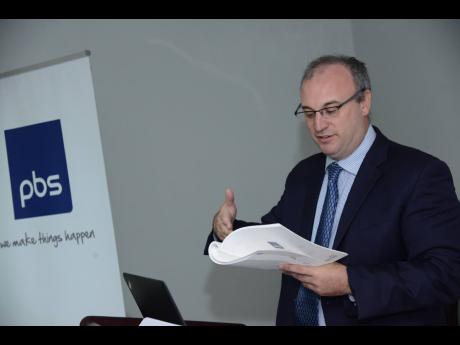PBS hired to add Internet connectivity to supermarkets
Productive Business Solutions, PBS, which sells printers, scanners and security devices, continues to shift towards technology services, with contracts from a major American retailer to add internet connectivity to supermarkets in five countries in the Americas.
PBS Chairman Paul Scott said the project would allow the company, which operates in over 20 countries, to enter into higher-tiered technology services. He declined to name the US retailer.
“It is an internet-of-things contract. We will install internet connectivity in every aspect of the supermarket — roughly 60,000 devices in five countries,” Scott told the Financial Gleaner.
“This is the most comprehensive and detailed contract that we have ever had,” he said.
In documents provided to the Financial Gleaner, the disclosed connectivity contracts were outlined among a series of new deals for PBS. They accounted for US$14.7 million of the US$40 million of new deals to be rolled out.
PBS will provide equipment and technology to allow for self-checkout within the US retailer’s supermarkets in Guatemala and Costa Rica by year end. The other three countries covered in the agreement are Nicaragua, El Salvador and Honduras.
PBS will also remotely monitor various aspects of the supermarket operations, such as fridge temperature for frozen foods. The company will send technicians to service these devices to prevent spoilage of goods.
With the internet connectivity contracts and other projects emerging from the pipeline, Scott was bullish about the company’s prospects.
“We will have a good year,” he said, following the company’s annual general meeting on Wednesday. “PBS will continue to grow despite the challenges of COVID-19.”
PBS earned US$180 million in annual revenue in 2019, the bulk of which included recurring revenue, while the rest was from new projects.
Scott said most of the company’s revenue remains unaffected by the pandemic because the inflows are bound to contracts.
COVID-19, however, led to work-from-home orders and the closure of offices across many of PBS’s markets, which negatively impacted its printing business as demand for printers and toners declined.
Last month, PBS secured a contract with the Barbados government on a digital national ID system that is similar to a project it is doing in Jamaica. Scott said that these projects, while important for the populations of the region, are “not that big” for PBS. The Jamaica project, for example, works out to about 1.0 per cent of total revenue, he said.
PBS earned US$31.3 million in revenue for its June second quarter, down from US$41.5 million a year earlier. The company spun from second-quarter profit of US$955,000 last year to a net loss of US$1.4 million this period.
“The loss in revenue was primarily related to our printing business, specifically in the office, print shops, education and government segments,” said PBS in its financial report.
“PBS is working with our partners in the printing business to implement marketing and incentive programmes to recover page volume and associated revenue (paper, supplies, and services),” it said.
Despite the challenges, its core earnings inched up to US$4.73 million before interest, tax, depreciation and amortisation, from US$4.69 million a year earlier.
During the quarter, PBS leadership focused on expense reduction and cash flow management, which resulted in cash growing to US$4 million from US$3 million.


